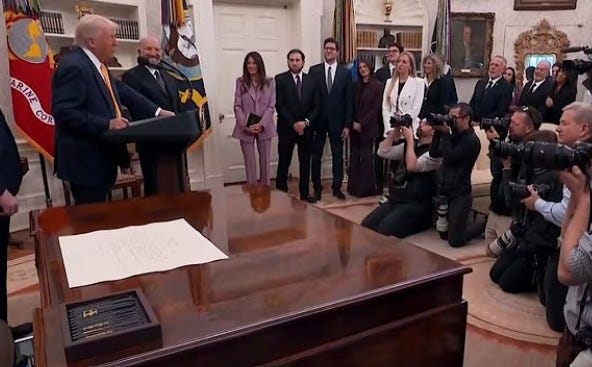From removing the few guardrails that kept Twitter from descending into toxic depths to fanning the flames of antisemitism on the same platform, Elon Musk seems to enjoy the handwringing by disapproving commentators. But while his theatrics are designed to draw attention—which perhaps will generate more revenue—what we should worry about is his taking an ax to our pillars of democracy. That is why we should add one more epithet to those already attached to his name: attack dog against the administrative state. Joining Steve Bannon, Trump’s acolyte who vowed to “deconstruct the administrative state,” Musk is attacking the institution protecting workers’ right to unite in defense of their interests.
Waging war on the nearly 90-year-old National Labor Relations Board (NLRB), Musk’s SpaceX is contesting a complaint against it because the New Deal-era institution itself is unconstitutional. Mimicking the arguments of a case pending in the Supreme Court, Securities and Exchange Commission v. Jarkesy, Musk’s space transportation company decries the use of administrative courts by the NLRB as a violation of the 7th Amendment’s right to a jury trial in civil cases and separation of powers. In addition, it claims that the NLRB members are too difficult to remove by the president, trying to shoehorn this attack into recent Supreme Court decisions severely limiting the ability of Congress to establish independent agencies.
It’s no secret that Musk hates unions, as do many CEOs. But Musk has outsized power, interplanetary ambitions, and little respect for norms. With his Tesla automobile and battery manufacturer, he faces emboldened unions, including the United Automobile Workers, which recently won historic new contracts from the Detroit vehicle companies and plans to try to organize Tesla. He’s also in a dispute with unions in Sweden, where Tesla has opened manufacturing facilities. In December, he told corporate leaders at The New York Times DealBook Summit, “I disagree with the idea of unions … I just don’t like anything which creates a lords and peasants sort of thing.”
Oh, please.
Musk’s attack on the NLRB betrays his real agenda—to bend government to his will, whatever the majority might want. Among the wealthiest people in the world, Musk can strong-arm elected and appointed leaders. Much of that power comes through government contracts and dependence on his companies. The Washington Monthly has documented how the federal government has the legal and regulatory tools to constrain Musk’s businesses but chooses not to use them. See “How to Rein In Elon Musk,” November 5, 2022.
A chilling example was related by the journalist Ronan Farrow in his New Yorker profile of Musk. According to Farrow, Colin Kahl, the U.S. Undersecretary of Defense, called Musk in 2023 after it became apparent that Musk’s Starlink internet service in Ukraine stopped functioning when the billionaire began to lose enthusiasm for the Ukrainian cause and told Kahl he would not restore Starlink access unless the U.S. paid for the service. The South African-born mogul also began to play Secretary of State by pitching his own concession plan that would have given Vladimir Putin’s Russia permanent control over Crimea. More ominously, his switch in sides allegedly caused Starlink to block connectivity for Ukrainian troops when they approached Russian territory. Washington and Kyiv panicked because without Starlink—without Musk—Ukraine would lose communications capabilities and, thus, most likely, the war itself.
The U.S. now depends on the 53-year-old Musk for more than supporting Ukraine. His companies are entwined with America’s move towards electric vehicles and the transport of NASA astronauts into space, among other national priorities. For instance, we depend on him for electric vehicle charging stations, a growing and essential part of our infrastructure. Moreover, he gets massive taxpayer subsidies to make his companies even bigger—and his influence even greater.
It is chilling to witness a plutocrat with so much influence over our government. Indeed, when Farrow was writing on Musk, a defense department official told him that they had precleared the conversation with Musk, saying, “We’ll talk to you if Elon wants us to,” which begs the question of who the Pentagon is working for, him or us.
To its credit, the NLRB is not so compliant. The NLRB’s case alleges that SpaceX fired employees who shared an open letter condemning Musk “for issuing inappropriate, disparaging, sexually charged comments on Twitter.” But rather than contest that the employees engaged in protected collective activity under the National Labor Relations Act, Musk’s SpaceX took aim at the entire structure of government since the Progressive Era. It’s not just the NLRB that has administrative courts and a multimember board; the states also employ them widely to ease burdens on courts and allow many more people to bring claims before independent arbiters. They make government function for the people. In addition, many agencies have structured multimembered leadership, including the Federal Communications Commission, the Federal Election Commission, and the Federal Trade Commission. It’s done this way to ensure deliberation and bipartisanship because the members have staggered terms and are appointed by different presidents.
Should Musk prevail against the NLRB, he will have dangerously hindered government’s ability to regulate financial markets, keep the internet accessible, protect us against dangerous products, and organize for a better workplace. It may have been Mark Zuckerberg who coined “move fast and break things,” but Musk is causing the most destruction.











